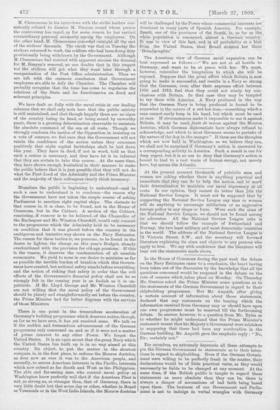The American view of German naval expansion can be best
expressed as follows :—" We are not at all hostile to Germany, and want to be at peace with her. We mud, however, remember the temptation to which she will be exposed. Sirppose that the great effort which Britain is now going to make is successful, and results in a Navy so strong that the Germans, even after their supreme effort between 1910 and 1912, feel that they could not wisely try con- clusions with Britain. In that case they may be tempted to try them with America. A Navy produced in the way that the German Navy is being produced is bound 'to be somewhat in the nature of a red-hot iron,—something which a. man cannot easily keep in his hand, but which must be used at once. If circumstances make it impossible to use it against Britain, it may be used, faute de mieux, against the Monroe doctrine, which German diplomatists have always refused to acknowledge, and which to most Germans seems to partake of the nature of the dog-in-the-manger." If thew are the thoughts which are now held in Washington, as we believe they are, we shall not be surprised if Germany's action is answered by a corresponding activity in America. Such a result is one for deep regret, but it is no use to deny that Germany's action is bound to lead to a vast waste of human energy, not merely here, but across the Atlantic.










































 Previous page
Previous page